

Mushroom

Fish

Ruit

Rope

Clay Pot

Paper

Ore

Amethyst

Village Points: The player with the most village points at the end of the game is the winner. A card with this symbol would give 3 extra village points.

Coins: Coins are used to purchase build- ings and train new villagers. They can also be used in some encounters

Beds: For each bed symbol on a card a player owns, he may move one villager from "injured" to "exhausted" OR "exhaust- ed" to "ready" on his player board.
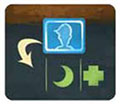
Train to Ready: If a player owns a card with this symbol, he may place newly-trained villagers in the "ready" area instead of the "exhausted" area.
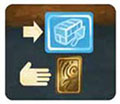
Gain a Coin When Building: If a player owns a card with this symbol, he gains 1 coin after he purchases a building card. He must pay the full amount for the building before collecting the bonus coin. A player does not collect a coin when he builds this card (only other cards).

Reroll: These symbols allow a player to reroll when performing an explore action. He must always keep the re- rolled number. (In this case, because there are 2 symbols, the player could reroll twice per encounter).
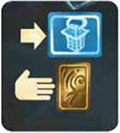
Gain a Coin when Exploring: If a player owns a card with this symbol, he gains 1 coin after completing a successful encounter.

Village Points for Villagers: This symbol gives 2 village points per villager the player owns.


Explore: These symbols represent how adept a villager is at exploring. For the left symbol, a roll of 1 or higher would give one lantern. For the right symbol, a roll of 4 or higher would give two lanterns.

Hammer: A villager with this symbol can complete the Build action.

Quill: A villager with this symbol can complete the Train action.
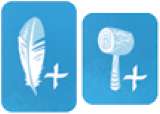
Hammer/Quill Plus: A villager with one of these symbols can com- plete a Build/Train action, and he pays one fewer coin when doing so.

Cave Cat: This symbol belongs to the cave cat. It means that each time a play- er assigns the cave cat to do an action, he must roll a die. On a roll of 1-2, the cat does not complete the action and is placed directly in the "exhausted" area.

Bad Reputation: A villager with this symbol causes the player to lose one reputation when the villager is gained.

Metal Man: These symbols belong to the Metal Man villager. They represent that this villager has his own bed, and that neither cider nor potions can be used on him.

Gain Reputation: When a player buys a card with this symbol, he immediately gains 1 reputation (only once).

Cider/Potions as Coins: A card with one of these symbols allows the player to spend ciders or potions as if they were coins.

Goods (on card): When a player buys a card with this symbol, he immediately places 2 goods of the specified type on it. The goods can be harvested from the card. The card never makes additional goods.

Replenishing Goods (on card): When a player buys a card with this symbol, he immediately places 1 good of the specified type on it. The good can be harvested from the card. At the end of the round, if the card does not have a good on it, the player places 1 of the specified good on it.

Village Points for Empty Caves: This symbol gives 1 village point per empty cave card (with no outpost) that the player owns.

Potion (on card): When a player purchases a card with this symbol, he immediately gains 1 potion token.

Potion Income (on card): At the end of each round, the player collects one potion.
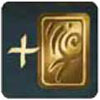
Income (on card): If a player owns a card with this symbol, he collects 1 extra coin at the end of each round.

Village Points for Things: If a player owns a card with this symbol, he gains bonus village points for owning speci- fied goods/etc. In this case, the player would gain 2 village points per potion and 2 village points per ore he owned at the end of the game.

Income for (Goods): This card grants one additional income for each amethyst and ore token the player has in his advancement track.
Continue Reading
